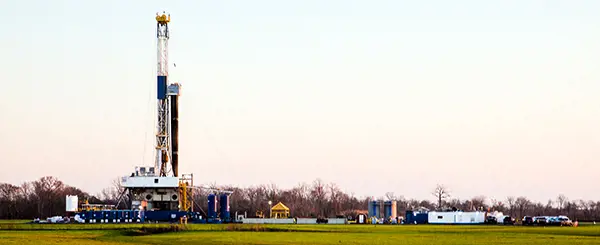With the steady emergence of proposals to explore and extract unconventional gas by fracking (hydraulic fracturing), the mainstream UK political parties have set out their positions on this controversial form of development when considering future UK energy supply. With the election campaign back in full flow and the main political parties having all issued their manifestos, each has confirmed their own stance towards the extraction of this source of energy by fracking.
The election promises are made against the backdrop of a changing pattern of energy supply which is seeing the emergence of lower carbon options including solar energy. Reported in the national press at the time, the National Grid has confirmed that 21 April was the first full day of coal-free power in 135 years. This was achieved through the generation of electricity from an increasingly varied range of power options. It reflects the changing face of the UK’s energy supply chain and follows on the heels of reporting in October 2016 that in the preceding six months, the electricity generated by solar panels had outstripped Britain’s ageing coal-fired power stations for the first time. The last Government had aimed to reduce the UK’s greenhouse gas emissions by at least 80% by 2050 (from the 1990 baseline).
The Conservative manifesto takes a supportive stance towards fracking, whereby:
- “The discovery and extraction of shale gas in the United States has been a revolution. Gas prices have fallen, driving growth in the American economy and pushing down prices for consumers.”
- "The US has become less reliant on imported foreign energy and is more secure as a result.”
- "We will therefore develop the shale industry in Britain.”
- “We will only be able to do so if we maintain public confidence in the process, if we uphold our rigorous environmental protections, and if we ensure the proceeds of the wealth generated by shale energy are shared with the communities affected.”
- The manifesto also sets out proposed changes to the consenting process:
- “We will legislate to change planning law for shale applications. Non-fracking drilling will be treated as permitted development, expert planning functions will be established to support local councils, and when necessary, major shale planning decisions will be made the responsibility of the National Planning Regime.”
In addition, the Tories propose that a new ‘Shale Environment Regulator’ would be set up, taking over responsibility for the fracking-associated roles currently performed by the Health and Safety Executive, the Environment Agency and the Department for Business, Energy and Industrial Strategy.
The Labour party in its manifesto undertakes to “ban fracking because it would lock us into an energy infrastructure based on fossil fuels, long after the point in 2030 when the Committee on Climate Change says gas in the UK must sharply decline”.
The Liberal Democrats in their manifesto oppose ‘fracking’ “because of its adverse impact on climate change, the energy mix, and the local environment”.
The Scottish National Party in its manifesto says:
"We have blocked underground coal gasification and a moratorium means fracking cannot take place in Scotland."
The Green Party manifesto states:
"We will introduce a ban on fracking, phase-out the £6bn-a-year fossil fuel subsidies, bring forward the coal phase out date to 2023 (at the latest), divest public funds from the fossil fuel industry, and ensure a just transition for those communities dependent on fossil fuel jobs."
Plaid Cymru makes no specific mention of fracking but in 2015 supported a moratorium.
Meanwhile on the ground, the development of unconventional gas opportunities continues to be challenged through the courts. In a decision in October 2016, the then Communities Secretary Sajid Javid agreed with his Inspector’s recommendations, to allow appeals for the development of exploration facilities for unconventional gas by hydraulic fracturing (fracking) at sites at Roseacre and Wharles on the Fylde, overturning the earlier decisions of Lancashire County Council to refuse planning permission for the exploratory developments. The decision has however been challenged on two occasions, latterly in April this year in the Court of Appeal, where Mr Justice Dove rejected objectors’ judicial review actions. It is understood that papers have again been lodged by an objector with the Court of Appeal to reconsider this decision.
Planning permission for similar development in North Yorkshire was granted in September 2016, for Third Energy to frack at Kirkby Misperton, near Malton. This decision was unsuccessfully judicially reviewed in November last year and the operation is now underway, although not without objectors based locally and at a nearby objector encampment known as the ‘Kirkby Misperton Protection Camp’ blockading the well site in April.
IGas received a resolution to grant planning permission in November 2016 from Nottinghamshire County Council, subject to a Section 106 planning obligation, for an exploratory site at a former MoD site in north Nottinghamshire. Following the decision, Stephen Bowler, CEO of IGas, said:
"We are at a critical juncture in the future of our energy mix and supply, as we move away from coal towards lower carbon sources."
In Scotland, where there is a moratorium on shale gas extraction, it is ironic that INEOS’ first US shipment of shale gas was received at Grangemouth Refinery in October 2016. This is the beginnings of a trade route which is likely to trigger an expansion of Scotland’s largest industrial complex. INEOS has previously obtained fracking exploration licences within the Central Belt, but has so far been blocked from implementation by the Scottish Government moratorium. It is thought that the most populated part of Scotland - the Central Belt - may contain substantial amounts of shale gas, oil and coal bed methane, where exploration could prove to be controversial.
With the snap general election countdown now in its final phase, we wait with great interest to see if unconventional gas firmly becomes an established component of the UK energy supply mix over the term of the next parliament.
Image credit: Daniel Foster



